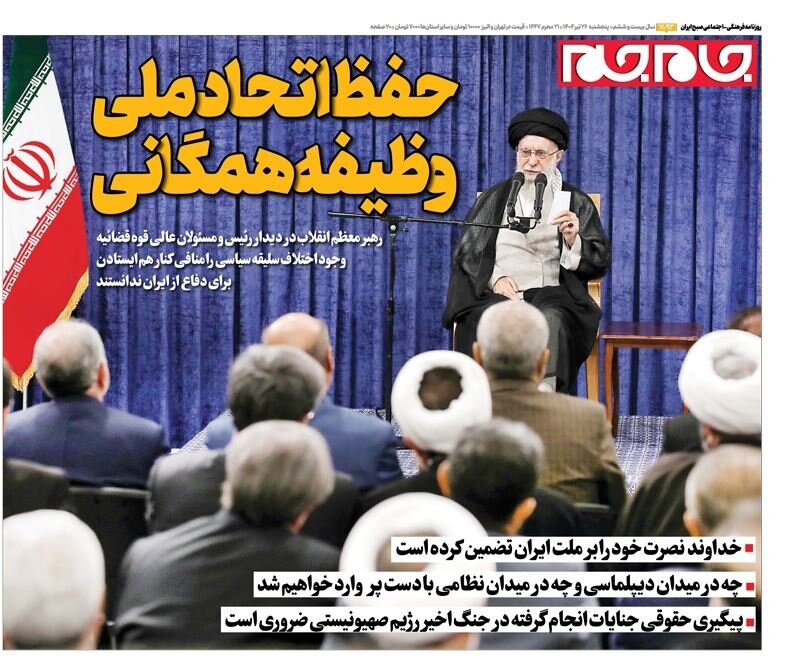Goals that failed

TEHRAN - In an analysis, Jam-e-Jam addressed Israel's goals that Israel sought in its start of war against Iran in June.
It wrote: Israel was pursuing three major goals in its confrontation with Iran: Preventing Iran from acquiring what it claims nuclear weapons, weakening or destroying the axis of resistance and the network of forces loyal to Iran in the region, and severely limiting Iran's ballistic missile program. These three goals have been clearly stated in Israel's security doctrine in recent years and have been the driving force behind the decision to take direct military action against Iran. From domestic policy goals, the Zionist regime's cabinet sought to change the political atmosphere and public opinion in the short term in favor of the government and the regime's political leadership by attacking Iran. In regional arena, the regime expected that by attacking Iran and weakening its position, which was its main strategic rival, the regime would change the balance of power in the Middle East in its own favor, leading to a relative improvement in the geopolitical position of the Zionist regime, and forming a kind of practical but informal coalition with Arab governments against Iran. But it failed to achieve these goals, and the international community condemned the attack.
Ettelaat: What if the snapback mechanism is activated?
Ettelaat examined the consequences of the activation of the snapback mechanism in an interview with Abdolreza Faraji Rad, a senior geopolitical expert. He said: The fact cannot be hidden that the snapback mechanism and its activation are considered a good tool for the Europeans and Americans to put pressure on Iran. But the problem is that with the activation of this mechanism, Iran will also be removed from the control of the International Atomic Energy Agency. This means the possibility of increasing tension and conflict in the region. If Iran withdraws from the NPT, the interests of the Europeans will also be at risk. It is not desirable for the Europeans if Iran gets out the control of the Agency. It is necessary for the Iranian side to enter dialogue with the Europeans as soon as possible. Iran must clarify its policies to the Europeans and share important issues with China and Russia so that they can be active in the Security Council. China and Russia should not adopt passive positions. We must talk to Europe and the United States simultaneously, and even, if necessary, we must begin direct negotiations. Europe and the United States are getting closer day by day in their opinions and reducing their differences on Iran, and postponing negotiations is not in our interest.
Etemad: Only power provides guarantees
In an interview with former MP Heshmatollah Falahatpisheh, Etemad discussed the issue of obtaining guarantees from the United States. He said: In the international arena, only power provides guarantees. If Iran had not emerged as the victorious and decisive party in the war with Israel, there would not have been even talk of negotiating with Iran now. Iran dealt the final blows to Israel in this war, and as the war drew nearer to its end, Iran unveiled more devastating weapons. This shows that power continues to provide guarantees. The 12-day war (June 13-24) brought lessons. Now, if the Iranian government observes these lessons in managing the country's affairs, it will come close to the same components of a guaranteeing power. The government must, in the current circumstances, make every effort to raise the morale, from the point of view of software, hardware, and military power. The message that these actions send to the United States and Israel is that if a war is started, Iran will use its latest destructive tools.
Iran: Tehran’s move to align policies against the West's monopolistic policies
In an article, the Iran newspaper discussed the purpose of Foreign Minister Araghchi's visit to China and said: Araghchi's recent visit to China was in line with strengthening the performance of the Shanghai Cooperation Organization, and is only part of a series of measures by Tehran to transform this organization into a lever for confronting sanctions, threats, and cross-border pressures. In such an environment, Iran, by taking advantage of multilateralism and regional alliances such as the Shanghai Cooperation Organization, is trying to win the legal and political support of independent global actors to confront the policy of pressure, sanctions, and military threats. After the 12-day war, Beijing and Moscow are not only Iran's economic partners but also actors with important diplomatic and geopolitical role in consolidate Iran's legitimacy in the international system. This trip was an attempt to align policies against the West's exclusive strategies, which gave Iran the opportunity to expand its multilateral diplomacy from Central Asia to the Security Council.
Leave a Comment